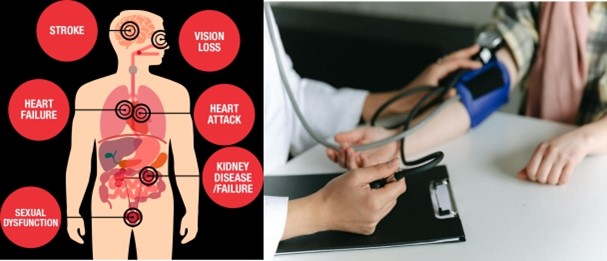
High blood pressure – or hypertension – is commonly known as a silent killer because it shows no signs or symptoms while it slowly harms the victim.
High blood pressure occurs when the force of blood against the walls of the arteries is too high. This increases the workload of the heart, making it pump blood harder.
Hypertension is a very common illness in the world and in Nigeria. It is said to affect more than 30% of adults globally and more than 1.5 million people every year in Nigeria.
Read along to discover how to measure your blood pressure, the common causes of high blood pressure, and how to detect if your blood pressure is high.
Measuring your blood pressure Blood pressure is measured in millimeters of mercury (mm Hg) and consists of two values: systolic pressure (the pressure when the heart beats) and diastolic pressure (the pressure when the heart rests between beats). The result is recorded as systolic over diastolic pressure (e.g. 120/80 mmHg).
An average adult is expected to have a blood pressure between 90/60mmHg and 120/80mmHg. High blood pressure reads from 140/90 mmHg.

How do I know if I have High blood pressure?
High blood pressure usually has no signs or symptoms. Regular check-up is the best way to know if you have high blood pressure.
However, rarely obvious symptoms of high blood pressure include headaches, dizziness, nosebleeds, and shortness of breath. In addition, watch out for warning signs like vision changes, chest pain, and extreme exhaustion. Checking your blood pressure regularly is also crucial for early detection.
What are the causes of high blood pressure?
A person’s blood pressure usually increases as they age due to a gradual build-up of plaque, which include fats, cholesterol, and other substances, in and on the artery walls. Plaque narrows the blood flow in the arteries, thereby increasing the blood pressure. Hence, older adults are more likely to have high blood pressure.
Other causes of high blood pressure include:
Family History
Genetics play a role in high blood pressure. If you have family members who have high blood pressure, you may be at risk of having the same. Some studies have also shown that black people are more likely to develop high blood pressure.
Lifestyle and diet
Certain lifestyle habits can contribute to hypertension. Lack of physical activity, smoking, and drinking alcohol are all risk factors for high blood pressure.
High fat and sodium consumption are also risk factors for hypertension. Studies have shown that the excessive consumption of salty foods makes your body retain more water to balance sodium and other electrolytes in the body. This extra water increases the volume of blood in your vessels and adds pressure to the walls of the arteries.
A diet high in sodium is one of the major causes of high blood pressure. The recommended intake of sodium for an adult is 2300 mg.
Obesity
Obesity is often associated with high blood pressure. Research has shown that obesity is the cause of 65-75% of primary hypertension. Excess body fat makes it difficult for the kidney to maintain water-sodium balance. This may lead to high blood pressure. Obesity may also cause insulin resistance and increased blood volume; these are all risk factors for hypertension.
Stress
Stress may temporarily raise the blood pressure. There is no proof that stress may lead to long-term hypertension. However, stress coupled with other factors may increase blood pressure. A study shows that stress can cause hypertension by repeatedly raising blood pressure and stimulating the release of hormones that may constrict blood vessels.
Underlying medical conditions
Certain medical conditions such as kidney diseases, diabetes, and hormonal disorders can cause or worsen high blood pressure. Pregnancy may also increase blood pressure.
Effects of High blood pressure
High blood pressure puts a strain on the heart by making it pump blood harder. It also reduces the blood flow to the heart and may damage the arteries.
People with high blood pressure are at risk of:
Heart failure, heart attack, heart disease, stroke, kidney disease, eye issues, neurological problems, and dementia
How can I prevent high blood pressure?
● Maintain a healthy lifestyle. Eat right, engage in physical activities, maintain a healthy weight, and drink enough water.
● Limit your intake of fatty and salty foods
● Avoid smoking and drinking of alcohol.
● Get quality sleep
● Manage stress effectively
Conclusion
High blood pressure increases the workload for the heart, making it pump blood harder. Long-term high blood pressure can strain the heart, damage blood vessels, and lead to serious health problems including heart failure, heart disease, stroke, and kidney issues.
The best way to know if you have hypertension is by regular check-ups. Know your blood pressure and control it by maintaining a healthy lifestyle, practice effective stress management techniques, and defeat this Silent Killer.
Mosope Ososanya is a professional Health and Life Sciences writer. She is dedicated to translating complex medical jargon into easy-to-understand language without sacrificing the accuracy of the medical concept. She has a diploma in health studies and is currently pursuing her Bachelor’s degree in Chemistry at the University of Lagos.





